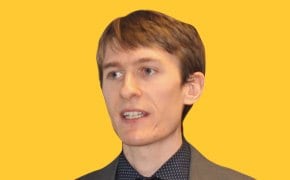Michael Crocker: My Next Great Impossible

Michael Crocker tells us about his prize-winning work at Vanderbilt University and his constant desire to keep learning.
“[This area] was pretty undeveloped…and I thought it had a lot of potential for growth.”
My work revolves around a reaction called umpolung amide synthesis and I’ve been trying to develop the functional motifs we encounter in that reaction and arrive at new methods. I was interested in this work because of the novelty of the approach. It was pretty undeveloped at the time I joined my lab and I thought it had a lot of potential for growth. This work has enabled me to use different techniques and develop new skills, which for graduate school is a really good fit.
“I expect [this] to fundamentally impact the way we put molecules together.”
Chemistry will always be a field of new technologies with vital impacts on every aspect of
human life. I expect C–H activation to fundamentally impact the way we put molecules together. It will have implications in the exciting areas of sustainable energy materials and personalized medicine. Artificial metalloenzymes may enable selectivity among hundreds of C–H bonds, while automation, machine learning and, in the longer term, quantum computing will increase the pace of discovery.
“Chemistry has more of an impact on our lives than many people know…”
Learning new stuff is fun. Chemistry has more of an impact on our lives than many people know and being part of the community that strives to advance that understanding drives me forward, even if I have a small part.
FAQ
Q: What kind of mindset do you need to achieve the Next Great Impossible?
A: Modesty is needed and a willingness to step outside your comfort zone. If you aren't willing to change and push your area of expertise forward, you can't ever develop the next new idea. You always need to be willing to learn.
Para seguir leyendo, inicie sesión o cree una cuenta.
¿No tiene una cuenta?